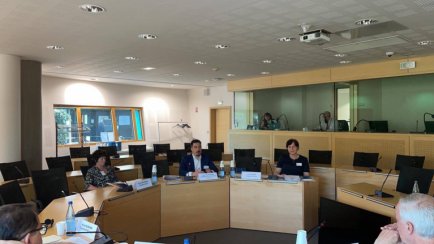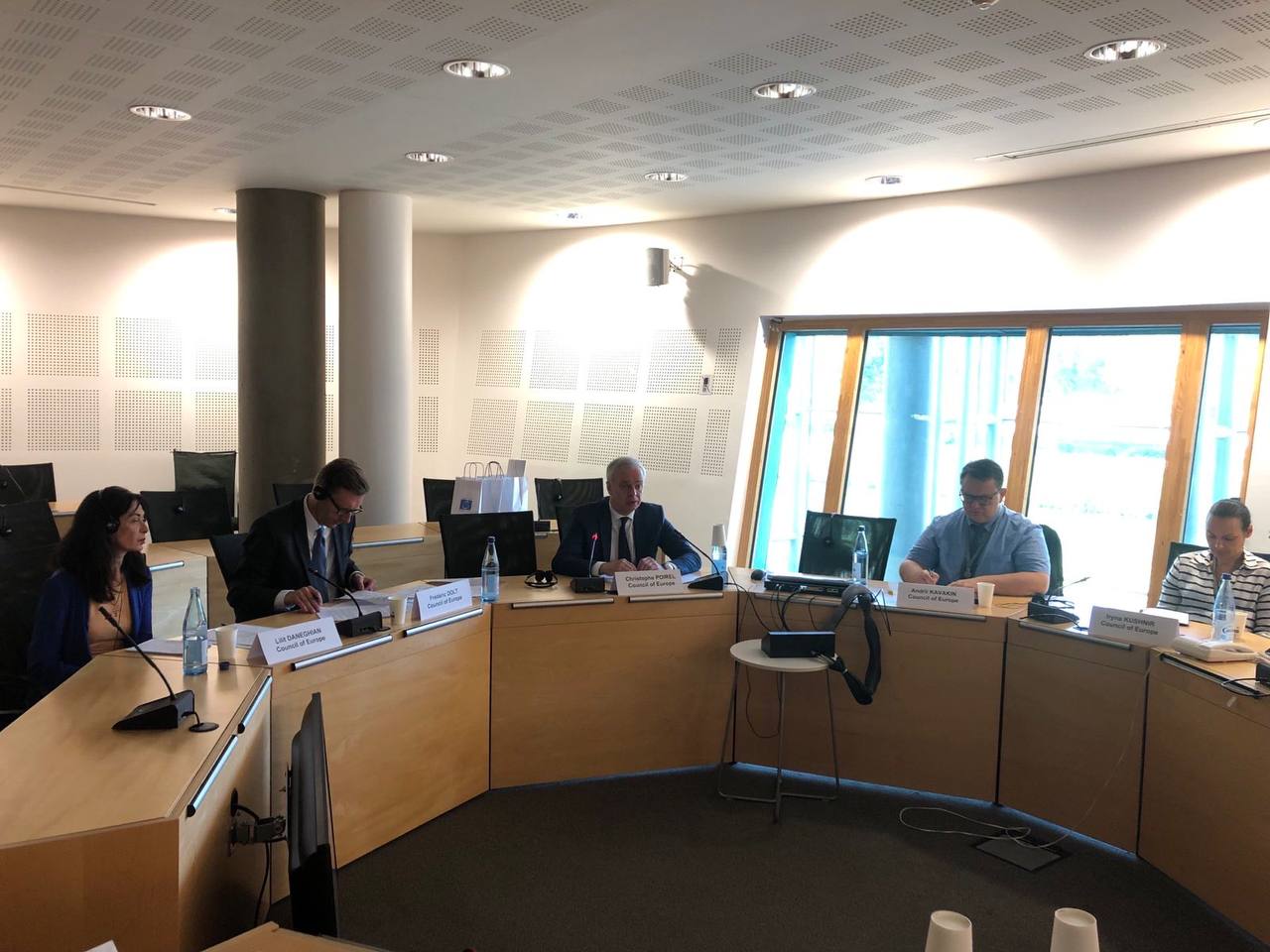Contact center of the Ukrainian Judiciary 044 207-35-46

During his working visit to Strasbourg, Vsevolod Kniaziev, President of the Supreme Court, held several meetings with the representatives of the European Court of Human Rights and the Council of Europe. Together with the President of the Supreme Court in Strasbourg, there are Iryna Hrihorieva, Judge of the Grand Chamber of the Supreme Court, and Lina Hubar, Head of the Division of International and Legal Cooperation. The visit is organized by the Council of Europe Project "Support for judicial institutions and processes to strengthen access to justice in Ukraine".
On June 23, 2022, Vsevolod Kniaziev and Christophe Poirel, Director of Human Rights, the Directorate General of Human Rights and Rule of Law of the Council of Europe, discussed challenges faced by the Ukrainian judiciary in the context of a full-scale Russian invasion.
The Council of Europe, according to Christophe Poirel, will do everything possible to help Ukraine in these difficult times. In the light of the circumstances, the Priorities of the CoE-UA Action Plan for the coming years need to be reconsidered. The Action Plan should be updated in line with the current challenges faced by the judiciary. One of such challenges is the non-functioning bodies of judicial governance - the High Qualification Commission of Judges of Ukraine and the High Council of Justice.
In his opinion, one of the priorities of the Ukrainian institutions and their European partners should be the identification and collection of evidence of human rights violations by the Russian aggressor.

Vsevolod Kniaziev thanked the Director of Human Rights for the support and assistance provided and said that the Council of Europe currently was one of the key partners of the judicial system of Ukraine.
The President of the Supreme Court highlighted that Russia's full-scale invasion in Ukraine had significantly shifted the focus of the work of the judiciary. He confirmed that it was a big problem for Ukraine that the human resource bodies of the High Qualification Commission of Judges of Ukraine (HQCJ) and the High Council of Justice (HCJ) did not operate, because the staff shortage in the courts was intensifying. In order to be able to operate these processes, the Verkhovna Rada of Ukraine amended the legislation and transferred some functions of the HCJ to the President of the Supreme Court, in particular, the transfer of judges from the occupied territories to the territory controlled by Ukraine.
“The war has changed everything. We experience a lot of pain, destruction, our soldiers give their lives, and our cities are bombed every day. Part of the territories is temporarily occupied, so some judges of Ukraine are under occupation. Justice in these territories has come to a standstill. Some of the judges managed to escape, but not all. Communication with some judges has been lost, and we know nothing about their fate, and some judges are being held captive by the Russian occupiers, and we are doing everything possible to release them," Vsevolod Kniaziev shared the realities of Ukraine with his European counterparts.
But, despite these tragic circumstances and unprecedented challenges, the vast majority of judges and court staff are fulfilling their duties. Due to the fact that the President of the Supreme Court has been given the authority to send judges to other courts, today more than two hundred judges from the occupied territories administer justice in the courts in Ukrainian-controlled territory, another 200 judges are on business trips.
Vsevolod Kniaziev also shared the information about the current state of court premises. "Seven court premises were completely destroyed, 60 were significantly damaged. The Borodianka District Court of the Kyiv region is one of the destroyed courts - its premises are not subject to restoration. Even during the war, citizens need justice, so we are doing everything in our power for this court and other courts of Ukraine to resume their work as soon as possible", - assured the SC President.
On the same day Vsevolod Kniaziev met with the representatives of the European Commission for Democracy through Law (the Venice Commission). The meeting was attended by the Secretary of the Venice Commission Simona Granata-Menghini and legal advisor Taras Pashuk.
.jpg)
Vsevolod Kniaziev said that the issue of improving the operational activities of the judiciary of Ukraine in the context of war, developing the current legislation and adopting the new one in order to make justice more efficient and accessible were currently on the agenda.
In addition, Ukraine should take care of the completion of the judicial reform, because it is one of the conditions for the European integration process. "We must also work in this direction and fulfill the obligations assumed by Ukraine," the SC President outlined the range of tasks. The roadmap for reform in the field of justice consists of several elements - the reform of the HQCJ of Ukraine and the HCJ, the improvement of the procedure for the appointment of judges of the Constitutional Court of Ukraine, anti-corruption policy, etc.
Simona Granata-Menghini emphasized that Ukraine should find a mechanism to fill 2 thousand vacancies in the judiciary, because this is a lot. She analyzed some elements of the judicial reform from the perspective of the findings of the Venice Commission and expressed her hope that the newly formed judicial authorities would be professional and enjoy high public confidence. The speaker remarked that she was pleased to observe the proactive position of the Supreme Court on all issues related to judicial reform.